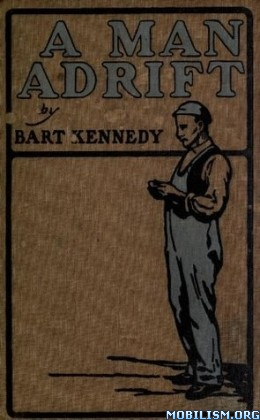A Man Adrift; Being Leaves from a Nomad’s Portfolio (Annotated) by Bart Kennedy
Requirements: .PDF reader, 13.7 MB
Overview: A Man Adrift (1900) is an autobiographical account of a young Kennedy who leaves England for the U.S. to work odd jobs for a few months here and there before “tramping” on to the next town over the horizon. “Tramp”, as a term, was popular around the turn of the century to describe laboring men who would move from one manual labor job to the next, often begging and sleeping out of doors. Kennedy’s memoir is a guidebook of how tramps lived. He ends up in California, where all tramps went when the west ran out. Along the way he worked on a skipjack oyster boat on the Chesapeake Bay, hauled cargo on the wharfs of Baltimore, mined in New York, was imprisoned in New Orleans, labored on the railroad in the Canadian Rockies, paned for gold in the Northwest, sang opera in San Francisco – his personal descriptions (usually) ring true and give the reader a vivid sense of what it must have been like. Kennedy lived and survived by the force of his body and the strength of his fist.
This is a fascinating look at life of the lower class working tramp at the turn of the century. Critical reception at the time was mixed, some “proper” critics panned it for its un-Victorian subject matter and improper use of English, but this was a period when unconventional voices (i.e. not from the privileged classes) were finding publishers for the first time as the cost of printing became cheaper. Andrew Lang gave it a favorable nod, saying “He describes, better than any other writer, the existence of a tramp, and gives an amazing account of the brutality, and even torture, practised on workers in some parts of the United States. .”. The only modern critic I could find is John Sutherland (1989) who says “As an author, he [Kennedy] is one of the early advocates of ‘tramping’, as the source of literary inspiration.” Kennedy was not the first tramp novel, Twain’s A Tramp Abroad (1880) is an example-by-title (Twain was too wealthy to be a real tramp), while Henry Davies’ The Autobiography of a Super-Tramp (1908) coined the delightful phrase “super-tramp”, better known today as the rock band (named after the book). The tramp story reached a height with Steinbeck’s Of Mice and Men in the 1930’s, a novel which makes more sense in the context of tramp literature tradition, which includes Kennedy and Davies who early on trampled down the road others would follow.
Genre: Non-Fiction > Biographies & Memoirs
Download Instructions:
https://ouo.io/XOerOf
https://ouo.io/aeVpPT
Trouble downloading? Read This.

